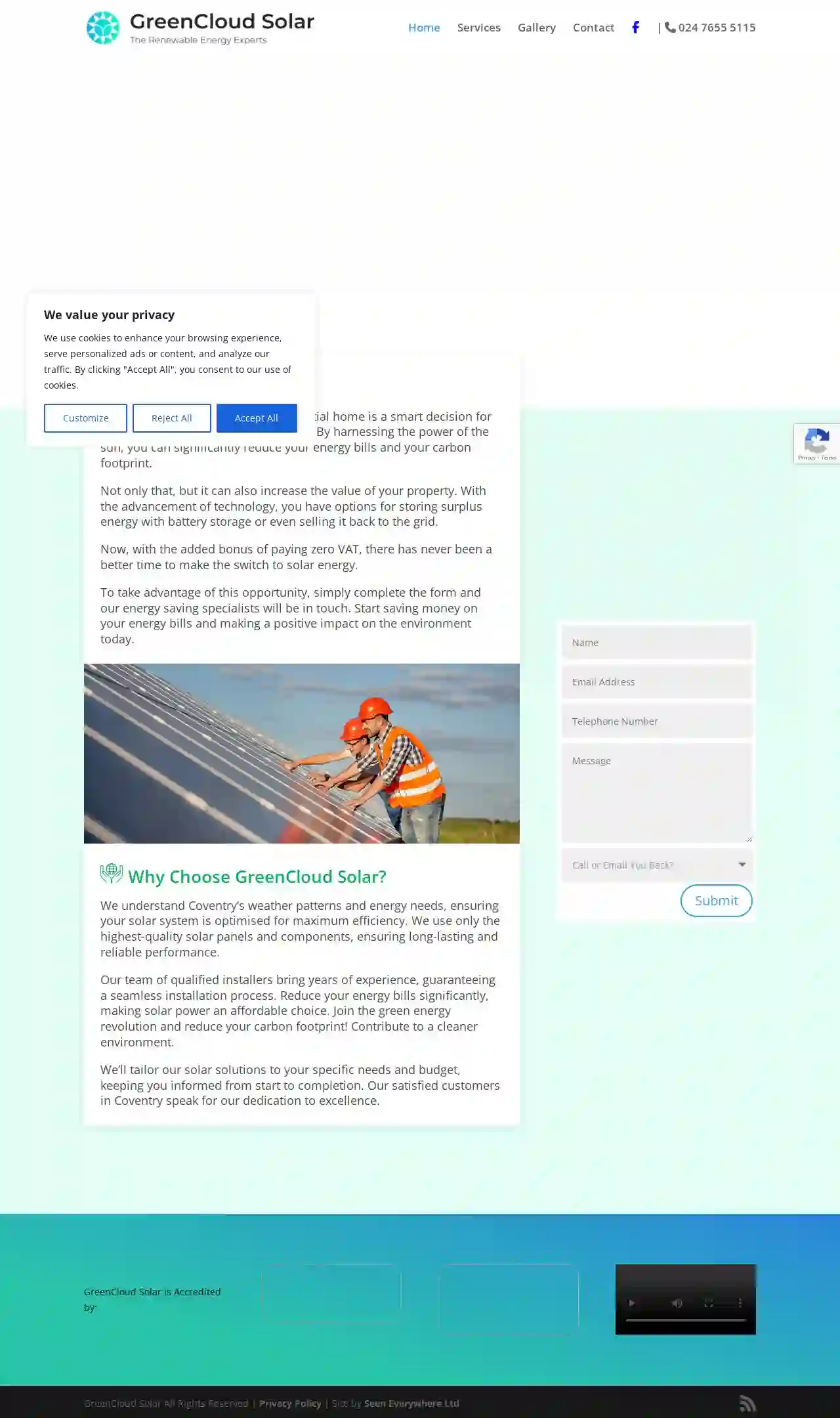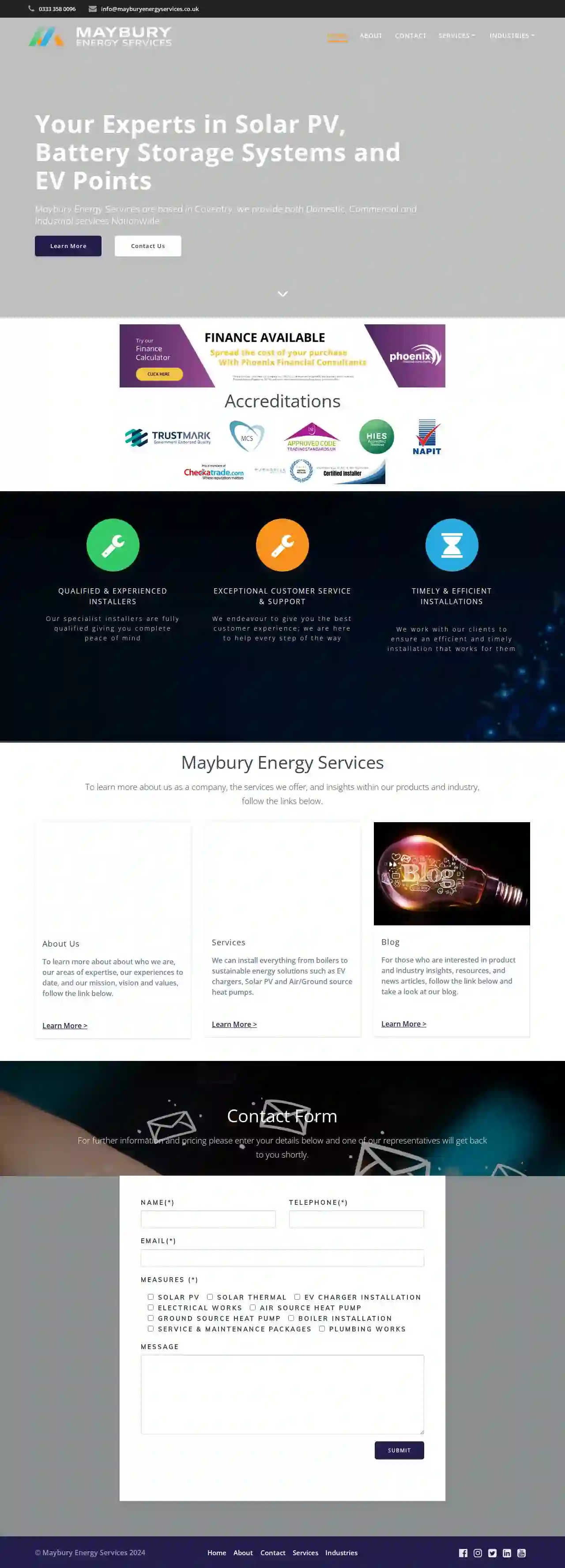Commercial Solar Installers Coventry
Best Business Solar Installers in Coventry
Get up to 3 Solar Panels For Businesses quotes for your project today! Compare profiles, reviews, accreditations, portfolio, etc... and choose the best deal.

Synergy Power Ltd
4.884 reviews46 Park Place, Sovereign Chambers, Leeds, LS1 2RY, GBWelcome to Synergy Power, a 21st century company embracing the need to provide renewable energy to the UK. We provide photovoltaic installations to domestic and commercial customers, and operate throughout the Midlands, Hertfordshire, Bedfordshire, and Buckinghamshire. We are able to work together with homeowners, councils, developers and business owners to meet our company targets of increasing the amount of electricity produced whilst reducing CO2 emissions with our high tech solar power panels. Every solar PV system installed by Synergy Power is individually designed to meet the customer’s requirements; we have the knowledge and machinery to build bespoke fixings if required for both commercial solar panels and domestic solar panels. All of our trusted employees are carefully selected to work with us and are all individually trained for their specific role within the business. At Synergy Power, we are not only working to fight climate change but also to give help and guidance to our customers in order to protect them against the escalating energy prices. As the average electricity consumption continues to climb, we want to help you reduce your utility bills and become more energy efficient. Synergy Power is accredited by the Microgeneration certification scheme meaning all of our solar power panels installations meet high UK standards and will be eligible for the smart export guarantee. We hope to convince you that our solar power panels are the ideal energy saving devices for your property! Please contact us today to find out what we can do for you.
- Services
- Why Us?
- Accreditations
- Gallery
Get Quote
GreenCloud Solar Ltd
Unit 1, Coventry Business Park, Coventry, CV1 2NT, GBWelcome to GreenCloud Solar, a leading provider of solar panel installation and support services in Coventry and surrounding areas. Our mission is to help homeowners and businesses reduce their energy bills and carbon footprint by harnessing the power of the sun. With years of experience and a team of qualified installers, we offer a range of services including solar panel installation, maintenance, and repair. Our goal is to provide our customers with a seamless and efficient experience, from initial consultation to installation and beyond. We are committed to using only the highest-quality solar panels and components, ensuring long-lasting and reliable performance. Our satisfied customers in Coventry speak for our dedication to excellence.
- Services
- Why Us?
- Accreditations
- Gallery
Get Quote
Maybury Energy Services Ltd
11 reviewsCoventry, GBMaybury Energy Services are based in Coventry, we provide both Domestic, Commercial and Industrial services Nationwide. Learn More Contact Us Accreditations QUALIFIED & EXPERIENCED INSTALLERS Our specialist installers are fully qualified giving you complete peace of mind EXCEPTIONAL CUSTOMER SERVICE & SUPPORT We endeavour to give you the best customer experience; we are here to help every step of the way TIMELY & EFFICIENT INSTALLATIONS We work with our clients to ensure an efficient and timely installation that works for them Maybury Energy Services To learn more about us as a company, the services we offer, and insights within our products and industry, follow the links below. About Us To learn more about about who we are, our areas of expertise, our experiences to date, and our mission, vision and values, follow the link below. Learn More > Services We can install everything from boilers to sustainable energy solutions such as EV chargers, Solar PV and Air/Ground source heat pumps. Learn More > Blog For those who are interested in product and industry insights, resources, and news articles, follow the link below and take a look at our blog. Learn More > Contact Form For further information and pricing please enter your details below and one of our representatives will get back to you shortly. Name(*) Telephone(*) email(*) Measures (*) Solar PV Solar Thermal EV Charger Installation Electrical Works Air Source Heat Pump Ground Source Heat Pump Boiler Installation Service & Maintenance Packages plumbing Works message Δ © Maybury Energy Services 2024
- Services
- Why Us?
- Gallery
Get Quote
Greenwatt energy
100 Broad Street, Birmingham, Unit 1, The Business Centre, B1 1AA, GBGreen Watt Energy is a leading provider of renewable energy solutions in the UK. We are passionate about helping businesses and homeowners reduce their carbon footprint and save money on their energy bills. With over 10 years of experience in the industry, we have a proven track record of delivering high-quality, reliable, and cost-effective renewable energy systems. Our team of expert engineers and consultants is dedicated to providing our clients with the best possible service and support. We offer a wide range of renewable energy solutions, including solar PV, wind energy, biomass, and heat pumps. We also provide energy efficiency audits and consultancy services to help our clients identify and implement energy-saving measures. At Green Watt Energy, we believe that everyone should have access to clean, affordable energy. We are committed to providing our clients with the highest quality products and services at competitive prices. We are also committed to working with our clients to develop customized solutions that meet their specific needs. We are proud to be a leading provider of renewable energy solutions in the UK and we are committed to helping our clients create a more sustainable future.
- Services
- Why Us?
- Accreditations
- Our Team
- Testimonials
Get Quote
Green Cabin Company
Mill Hill, Baginton, Coventry, CV8 3AG, GBThe Green Cabin Company is a business that supplies and installs renewable energy systems and designs and manufactures environmentally friendly outside buildings and structures. We are installers of Solar Photovoltaic and battery systems for domestic properties and off-grid buildings and commercial properties. We also install Solar Thermal systems for domestic hot water and swimming pools. Our cabins are unique and handmade, consuming fewer fossil fuels in operation and manufacture. We have helped build medal-winning Chelsea Flower Show gardens and were winners of the SME Coventry and Warwickshire Business Award 2017.
- Services
- Why Us?
- Our Team
- Gallery
Get Quote
Solar Tops
512 reviews123 Main Street, Coventry, CV1 1AA, GBSolar Roofs that save you money solar | Heating | Battery | EV Call Now welcome to Solar TopsA family run renewable Energy company Contact us over 15 years experience inrenewable energy Contact us welcome to Solar TopsProtect yourself againstrising energy costs Contact us Power your home with renewable energy
- Services
- Why Us?
- Accreditations
- Our Team
- Gallery
Get Quote
Coventry University
4842 reviewsPriory Street, Coventry, CV1 5FB, GBCoventry University is a global Education Group with a reputation for equity and innovation. We offer a wide range of exciting courses, from undergraduate to postgraduate, and online learning opportunities. Our research is challenge-led and innovation-focused, and we have a strong track record of creating better futures for our students, colleagues, partners, and stakeholders.
- Services
- Why Us?
- Gallery
Get Quote
KUMOJA
57 reviewsCoventry, GBKumbaDirect.com is a trading website of Sortfast Ltd. Registered in England and Wales Reg. No. 13086039, 20-22 Wenlock Road, London, N1 7GU. All prices include VAT. Credit subject to status and affordability. Terms & Conditions apply. Sortfast Ltd. trading as www.kumoja.com is a credit broker and not a lender. Kumoja is authorised and regulated by the Financial Conduct Authority (FCA). We ensure you get the highest quality equipment installed by skilled installers. Buy solar panels and packages with ease and flexibility, with options to pay later and spread the cost into monthly affordable payments. Our popular services include Solar, Boreholes, Home Appliances, and Building Supplies. Get in touch with us through WhatsApp or email for any questions or concerns.
- Services
- Why Us?
- Accreditations
- Gallery
Get Quote
EEHomes
Not provided, GBEE Homes is one of the UK's leading home improvement energy efficiency companies. We help our customers make their homes more energy efficient by accessing funding to install new energy efficient solutions. Our mission is to make it easy and affordable for everyone to improve the energy efficiency of their home and reduce their carbon footprint in the process. We're committed to providing an excellent customer experience, and we're proud to have helped thousands of people save money on their energy bills.
- Services
- Why Us?
- Accreditations
- Our Team
- Testimonials
- Gallery
Get Quote
Clean Energy Ltd
51 reviewsCoventry, GBClean Energy LTD is a company that specializes in solar energy solutions for homeowners. With decades of experience in the industry, they offer a wide range of services to meet the needs of their customers. Their team of experienced and certified solar installers work closely with customers to design a solar system that is right for them. They use only the highest quality solar panels and equipment and offer free consultations and competitive pricing. They also offer a variety of financing options to make it easier for customers to switch to solar energy. The company is passionate about helping homeowners switch to solar energy and believes that it is the future of energy production. They are committed to making it more accessible and affordable for everyone.
- Services
- Why Us?
- Gallery
Get Quote
Over 3,485+ Solar Installers on our directory
Our solar providers operate in Coventry & surroundings!
SolarCompaniesHub has curated and vetted Top Solar Installers in Coventry. Find the most reliable business today.
Frequently Asked Questions About Commercial Solar Installations
- Investment Tax Credit (ITC): A federal tax credit that allows you to deduct a percentage of the cost of your solar system from your federal taxes.
- Accelerated Depreciation: A tax benefit that allows you to depreciate the value of your solar system over a shorter period, reducing your tax liability.
- State and Local Rebates: Some states and municipalities offer cash rebates or other financial incentives for commercial solar installations.
- Performance-Based Incentives (PBIs): Some programs provide payments based on the amount of solar energy your system generates.
- Renewable Energy Credits (RECs): You can earn and sell RECs, which represent the environmental attributes of your solar energy production.
- System Cost: The total upfront cost of the system, including panels, inverters, installation, permitting, and other expenses.
- Energy Savings: The estimated annual savings on your electricity bill based on the projected energy production of the system.
- Incentives and Rebates: Include any applicable tax credits, rebates, or other financial incentives that reduce the net cost of the system.
- Depreciation: Factor in the depreciation value of the system over time, which can reduce your tax liability.
- Maintenance Costs: Estimate the annual maintenance costs for your solar system.
- Electricity Rate Inflation: Consider the potential increase in electricity rates over time, which will amplify your energy savings from solar.
What are the available government incentives for commercial solar in UK?
How do I calculate the ROI of my commercial solar investment?
What is the future of commercial solar?
How do solar panels affect my building's insurance?
What are the available government incentives for commercial solar in UK?
- Investment Tax Credit (ITC): A federal tax credit that allows you to deduct a percentage of the cost of your solar system from your federal taxes.
- Accelerated Depreciation: A tax benefit that allows you to depreciate the value of your solar system over a shorter period, reducing your tax liability.
- State and Local Rebates: Some states and municipalities offer cash rebates or other financial incentives for commercial solar installations.
- Performance-Based Incentives (PBIs): Some programs provide payments based on the amount of solar energy your system generates.
- Renewable Energy Credits (RECs): You can earn and sell RECs, which represent the environmental attributes of your solar energy production.
How do I calculate the ROI of my commercial solar investment?
- System Cost: The total upfront cost of the system, including panels, inverters, installation, permitting, and other expenses.
- Energy Savings: The estimated annual savings on your electricity bill based on the projected energy production of the system.
- Incentives and Rebates: Include any applicable tax credits, rebates, or other financial incentives that reduce the net cost of the system.
- Depreciation: Factor in the depreciation value of the system over time, which can reduce your tax liability.
- Maintenance Costs: Estimate the annual maintenance costs for your solar system.
- Electricity Rate Inflation: Consider the potential increase in electricity rates over time, which will amplify your energy savings from solar.
